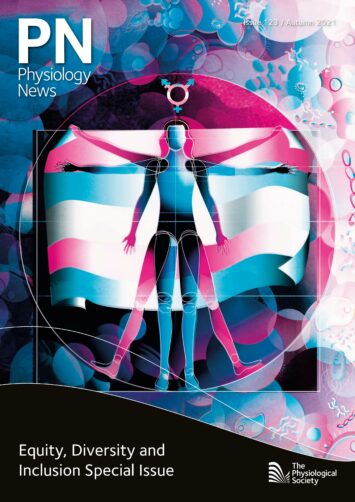
Physiology News Magazine
Wiley’s new author name change policy
News and Views
Wiley’s new author name change policy
News and Views
https://doi.org/10.36866/pn.123.13
Azariah Kurlantzick, Journal Publishing Assistant, Wiley
We at Wiley are proud to be leading the way in trans-inclusive scholarly publishing with our Author Name Change Policy that prioritises the choice of anonymity. The new policy, implemented in December 2020, allows authors to change their names in previously published works without notifying co-authors or the publication of a correction statement (1). Thanks to the Author Name Change Policy, we are now republishing articles and redelivering updated metadata to indexing services without burdening authors with the responsibility of providing documentation of their name change.
For the transgender community, as well as for authors changing religions or marital status for example, this simplified process is a much-needed improvement over the antiquated practice of publishing a correction notice with each name change. Name changes are never easy, but always important. According to the National Center for Transgender Equality, “gender incongruent identification exposes people to a range of negative outcomes” (2). This exposure comes up often enough in daily life, and publication records make name changes all the more visible for trans authors.
Requiring a trans person to be outed by including works published under their deadname on a job application or faculty webpage can have serious implications for their career and even their safety at work. According to Stonewall’s 2018 LGBT in Britain – Work Report, “One in eight trans people (12%) have been physically attacked by customers or colleagues in the last year because of being trans.”3 Unsurprisingly, the same report notes that “One in four trans people (26%) aren’t open with anyone at work about being trans. This number increases to almost two in five non-binary people (37%) who aren’t out at work.” Protecting the privacy of authors undergoing name changes allows them to reclaim their publication history without fear of repercussions. Name change policies make sure that an author can maintain a seamless bibliography under the name that affirms their identity.
Wiley’s previous policy, which was standard in scholarly publishing, was designed to focus on the integrity of the historic record. As we began considering a policy more sensitive to author needs, we made sure we involved trans researchers at every step of the process to ensure our new policy would work for them.
Along with trans employees at Wiley, one group of trans researchers that united around the issue of name change policies last summer was essential in informing the development of our new policy. One member of that group is Irving Rettig, a chemistry PhD. candidate at Portland State University. “I’m so pleased with the work Wiley has done to ensure that trans authors were involved at every stage during their policy reconstruction”, says Rettig. “Growing support from large publishers like Wiley really helps us apply pressure to publishers who have been reluctant to engage in these discussions. Right now, the publishing landscape is changing in a profound way; before, cisnormative biases informed academic publishing practices and created barriers for trans authors. Now, they are working alongside us to support and uplift our academic excellence in the way that we have always deserved.”
Much has changed since we introduced our updated name change policy last December. The Committee on Publication Ethics released updated guidance for author name changes in January, and other publishers have been slowly rolling out their own policies in the months since. In the meantime, Wiley has processed name changes for over 60 authors in the 6 months since implementing our new policy compared with just two name changes in the entire previous year.4 The numbers speak for
themselves—trans researchers waited long enough for these overdue policy changes.
Looking ahead, we know there is more to be done to make scholarly publishing more inclusive of trans community members. One of Wiley’s next steps to better serve trans authors is to offer the option to include personal pronouns in author bylines. In the meantime, some authors are taking the initiative to include their personal pronouns in the acknowledgements in their work. Kai J. Huang, an undergraduate researcher at UCLA, took to Twitter to announce “My FIRST journal publication ever includes me as a co-author AND is the first time I’ve seen an author who uses neopronouns have them included in a publication, especially in STEM!” (5)
Kai’s excitement speaks to how important accurate self-identification is for trans authors. We are committed to ensuring that trans authors feel respected throughout the publication process.
The scholarly publishing community has come a long way in creating a supportive, inclusive research environment. We are pleased to see that our fellow publishers and the industry as a whole are changing along with us, and we look forward to continuing to drive meaningful and long-lasting change together.
References and Resources
1. https://www.wiley.com/network/the-wiley-network/new-author-name-change-policy-supports-a-more-inclusive-publishing-environment
2. https://transequality.org/issues/identity-documents-privacy
3. https://www.stonewall.org.uk/system/files/lgbt_in_britain_work_report.pdf
4. https://publicationethics.org/news/vision-more-trans-inclusive-publishing-world
5. https://twitter.com/kaijhuang/status/1388948631231733760
